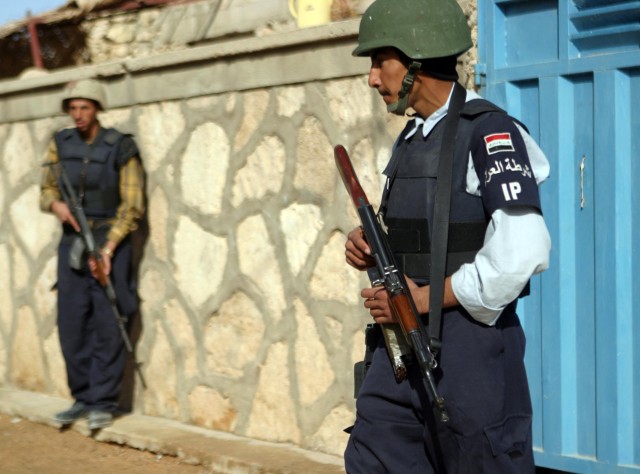CAMP VICTORY, Iraq (American Forces Press Service, Jan. 8, 2007) - The general responsible for day-to-day operations in Iraq said today that the conflict hinges on closing the gap between the people of Iraq and their fledgling government.
Nearly a month into his command of Multinational Corps - Iraq, Lt. Gen. Ray Odierno spoke at length with reporters about the complex issues surrounding Operation Iraqi Freedom and some of the strategies he plans to use to help stabilize the country.
Violence from a number of different groups has created a rift between many Iraqis and their government. In order to stabilize the country, the coalition must work with Iraqis to establish legitimate, competent Iraqi security forces and work toward provincial elections, which will produce locally elected government officials, Odierno said.
These objectives cannot be achieved through military efforts alone, however, and must be paired with economic and governmental initiatives. In order to achieve success, Americans must be patient while Iraq's government continues on the path toward self-sufficiency, Odierno said.
Enemies that coalition forces face in Iraq break down into three main categories: Sunni extremists who seek to regain the power they had under Saddam Hussein, Al Qaeda operatives who aim to establish a safe haven from which they can conduct future terrorist operations and Shiite extremists who want to implement a strict Islamic government grounded in Sharia law, Odierno said.
The simultaneous activity of the three groups has led to the onset of sectarian violence - in which Sunni and Shiite groups are battling for superiority. Complicating matters further are extremist militias, which have sprung up to provide security in the wake of all the sectarian strife, Odierno said.
Though the job of tamping down the violence will be challenging, Odierno said there are signs of hope.
On Jan. 15 the 2nd Iraqi army division will take charge of security in Mosul and the 3rd Iraqi army division will do the same in Tal Afar. In both cases, coalition forces will move to nearby cities and assume more of a combat support role, he said.
In the last 90 days coalition forces have made great strides in the Anbar province, an area west of Baghdad that is the main stronghold for al Qaeda in Iraq. Coalition forces have partnered with local tribes in an effort against al Qaeda, and recruiting for police in the area has increased significantly. Furthermore, recent polls of Iraqis indicate that 75 to 80 percent of the population rejects al Qaeda and militias, Odierno said.
The coalition must take advantage of these successes and fill the security void by working with Iraqis to defeat insurgents and extremists in violence-plagued areas. Once areas are secure, Iraqi forces, augmented by embedded American military transition teams, will take over security operations. The goal is to have Iraqis leading the security effort within Baghdad by late summer or early fall, Odierno said.
But as Iraqi forces continue to grow, care must be taken to ensure those within the ranks are loyal to Iraq, rather than some other entity, Odierno said.
"We've got to make sure that the leaders in place - the battalion commanders, the brigade commanders, the division commanders - are not sectarian in nature," he said.
Even with success on the battlefield, challenges will remain, Odierno said.
"There's always going to be violence, but there's a certain level of protection that allows you to operate on a daily basis," he said.


Social Sharing